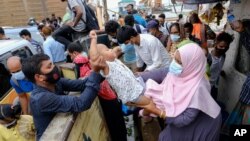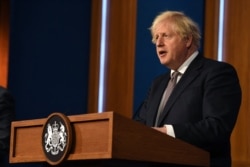As many countries ease pandemic restrictions amid rising vaccination rates, Bangladesh and Russia both broke one-day COVID-19 records.
Moscow announced that it would ease travel restrictions on Russians who had been vaccinated as it also reported over 700 deaths from COVID-19 — a one-day record for the country — on Tuesday.
According to the Johns Hopkins Coronavirus Resource Center, some 140,000 Russians have died from the virus. But the true death toll is believed to be much higher.
Bangladesh reported 11,525 positive cases Tuesday, the highest one-day case number since the beginning of the pandemic. The country also saw 163 deaths in the past 24 hours, the government reported.
The country shares a border with India, where the more contagious and serious delta variant emerged. Health experts in Bangladesh believe infection and death numbers are likely higher.
Meanwhile, in Europe, some countries announced Tuesday the easing of some restrictions imposed to quell the spread of the virus.
Germany announced it was lowering travel restrictions due to the delta variant on Britain and four other nations.
The Robert Koch Institute, Germany’s public health agency, said it had downgraded Britain, Portugal, Russia, India and Nepal from its highest risk category of “areas of variant concern” to “high-incidence areas.”
The change means travelers from those countries can avoid going into mandatory quarantine if they can prove they have received a COVID-19 vaccine, while those who have not been vaccinated must enter a 10-day isolation period. The quarantine period can be shortened to five days if a person tests negative for COVID-19.
British Prime Minister Boris Johnson announced Monday that the government is aiming to end its latest lockdown on July 19, despite a growing number of coronavirus cases caused by the highly transmissible delta variant.
Johnson said the mandatory indoor mask wearing and social distancing requirements will end but that businesses could still require them.
He said a final decision on the reopening date would take place next week.
Meanwhile, Israel and South Korea have announced an even swap of COVID-19 vaccines as both countries seek to jump-start their vaccination campaigns.
The deal calls for Israel to send 700,000 doses of the Pfizer vaccine to South Korea later this month, with South Korea sending back an equal amount of Pfizer vaccine it has already ordered as soon as September.
“This is a win-win deal,” Israeli Prime Minister Naftali Bennett said in a written statement Tuesday announcing the deal.
The spread of the delta variant, first identified in India, has led to a jump in cases in countries around the world, including in South Korea. Health officials in Seoul reported 711 new cases Monday, the third consecutive day of more than 700 cases. Most cases came from the populated Seoul metropolitan area.
The pandemic continues to affect the international sports world, with organizers of the Australian Grand Prix auto racing event announcing Tuesday that it is canceling the Formula One race for the second consecutive year because of Australia’s strict travel and quarantine mandates.
The race, initially scheduled for March 21, was pushed to November 21, just two weeks after the Brazilian Grand Prix in Sao Paulo, making it impossible for the drivers and their teams to complete Australia’s mandatory 14-day quarantine and prepare for the race. The 2020 race at Melbourne’s Albert Park street circuit was abruptly canceled as the pandemic began to take hold globally.
The Australian Motorcycle Grand Prix, which was scheduled for October, has also been scrapped for a second year.
As of late Tuesday, there were more than 184.4 million global COVID-19 cases, including 3.9 million deaths, according to Johns Hopkins. The United States continues to lead both categories with 33.7 million total cases and 605,857 deaths.
Johns Hopkins is also reporting more than 3.2 billion vaccine doses have been administered around the world.
This report includes information from the Associated Press, Agence France-Presse and Reuters.







